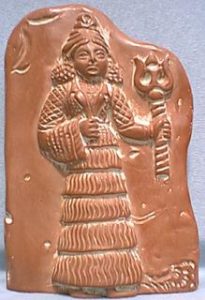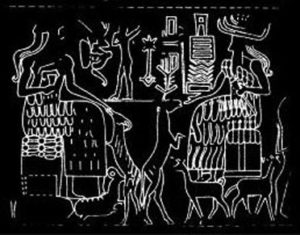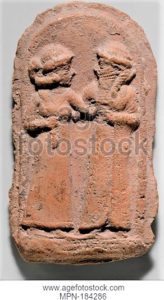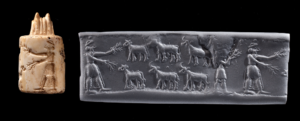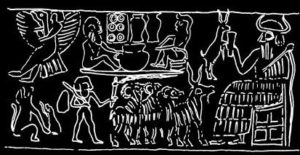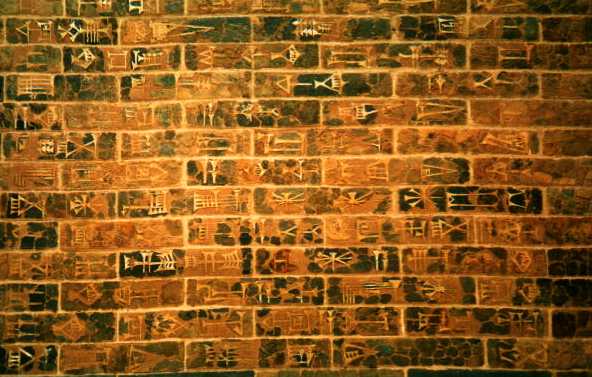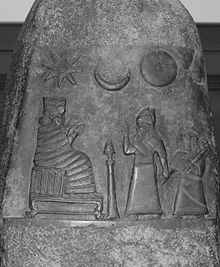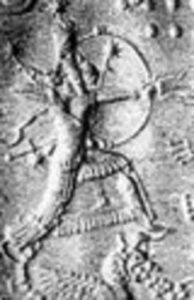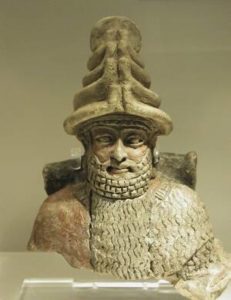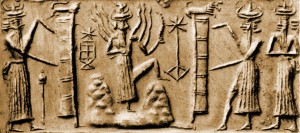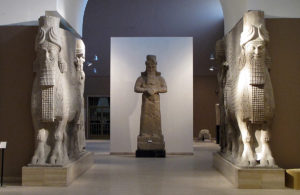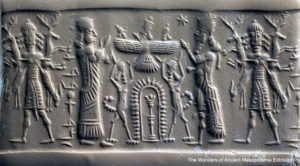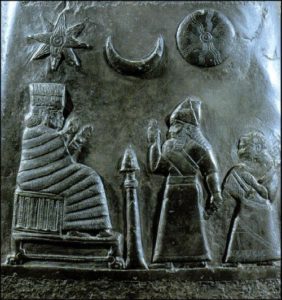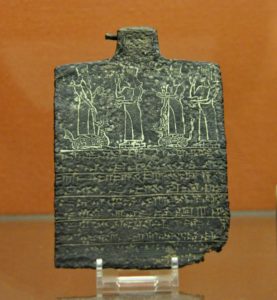(ANU + ANTU – King & Queen, royal rulers of Nibiru)
The 12 main royal family of gods from Nibiru, & their ranking order numbers
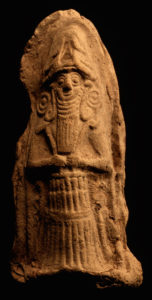
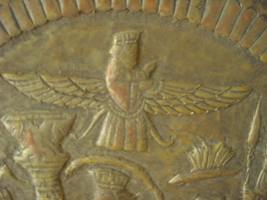
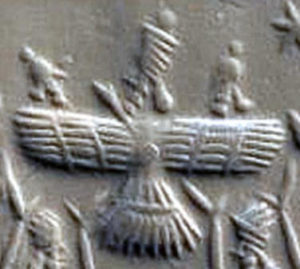 (Anunnaki King Anu) (Anu in his sky-disc) (son & heir Enlil, King Anu, & eldest son Enki in their sky-disc)
(Anunnaki King Anu) (Anu in his sky-disc) (son & heir Enlil, King Anu, & eldest son Enki in their sky-disc)
1) King Anu – ranking #60
2) ½ sister-spouse Antu – #55
. At least 21 divine couples preceded Anu as king of Planet Nibiru
. chief of Heaven and Earth
. father to the “sons of God” who came down to Earth
. Anu‘s symbol is the 8-pointed star, ancient Hebrew symbol for God
. Anu‘s patron city-state was Uruk / Biblical “Erech”
. Anu‘s temple – residence while on Earth was in Uruk, called “E.Anna”, “house of An”
. Anu‘s heavenly abode is an artificial garden sculptured in semi-precious stones
. gateway to Anu once flanked by Tammuz / Dumuzi and Gizzida / Ningishzidda – his young descendants
. Anu‘s throne room is the place of “The Assembly of the Gods”
. son Enlil sits on the right of Anu; son Enki sits on the left side of Anu at the “Assembly of the Gods”
. Anu had 6 concubines and 80 offspring, 14 by Antu as their
1 – Prime Minister
3 – Commanders in Charge of the Mu’s (rocket ships)
2 – Commanders of the Weapons
2 – Great Masters of the Written Knowledge
1 – Master of the Purse
2 – Chief Justices
2 – “Who With Sound Impress”
2 – Chief Scribes, (with 5 asst. scribes)
. Anu was visited in heaven by Inanna / Ishtar at least twice, also Dumuzi, Ningishzidda, Adapa, Kings Etana, Tyre, Enmeduranki, & others, such as Biblical Enoch
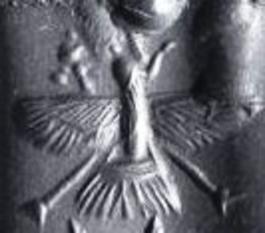
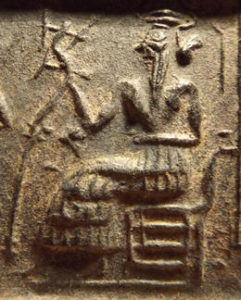
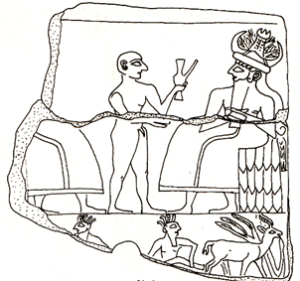 (Enlil & father King Anu in their sky-disc) (Enlil hands labor of farming over to the earthlings) (Enlil served by earthling worker)
(Enlil & father King Anu in their sky-disc) (Enlil hands labor of farming over to the earthlings) (Enlil served by earthling worker)
3) Enlil, son & heir to the king via mother Antu – ranking #50
4) spouse Ninlil / Sud – ranking #45
. Enlil was banished to the “Lower World” for raping Sud / Ninlil, who later married him, his crimes then forgiven
. heir to father Anu, and son to Anu’s official sister-wife Antu, born on Nibiru of the “double seed”, placing him next to be king, even before older brother Enki
. Lord Commander of Earth Colony – Chief Executive to the “Assembly of the Gods”
. founder of the “Garden of Eden” in Sumer / Mesopotamia / Southern Iraq (artifact above Enlil with plow)
. Larsa was Enlil‘s 1st patron city-state, built 2nd, later he moved inland to Nippar
. Nippar was built 3rd – “Mission Control Center”, the communication “Bond Between Heaven and Earth”
. Enlil‘s temple – residence in Nippur was named “E.Kur”, “House Which is Like a Mountain”
. overseer of purifying the gold taken from the “Abzu” & lower part of the world
. Enlil had son Ninurta with his ½ sister Ninhursag / Ninmah / Ninti, who was born of the “double-seed” law of succession, & therefore to be Enlil‘s heir
. Enlil and Ninlil had 2 main sons together, Nannar & Adad, plus others…
. Enlil is accredited with giving mankind agriculture, sheep, etc., in Eden
. Enlil gave the final approval for kingship to be “lowered from heaven”, & established high-priests & high-priestesses (positions of authority over earthlings for the giant mixed-breed offspring of the gods, therefore acting as go-betweens)
. after Noah, Enlil decided gods would no longer mix with earthlings, their years will be only one hundred and twenty
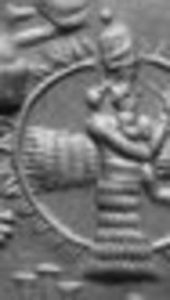
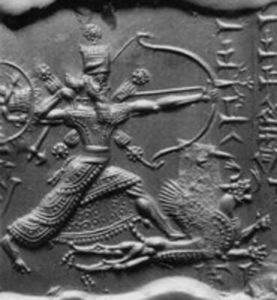
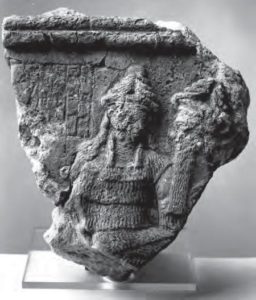
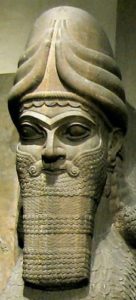 (Ninurta inside his sky-disc) (Ninurta riding his winged storm-beast) (Royal Princess Bau & her spouse Ninurta) (Ninurta)
(Ninurta inside his sky-disc) (Ninurta riding his winged storm-beast) (Royal Princess Bau & her spouse Ninurta) (Ninurta)
Ninurta, next heir to King Anu following father Enlil, assigned the number of Enlil as his heir
. #50, when he steps into the “Enlilship” / rulership, spouse Bau will then be #45
. Ninurta was born on Nibiru. he & Marduk were only ones from that generation born there, the younger were born on Earth
. Ninurta married Bau / Gula, King Anu‘s daughter, father Enlil‘s ½ sister, & his own aunt
. Ninurta‘s 1st patron city-state was Larak, the 5th city built, “Lord who completes the foundation”
. Ninurta battled & shot down Zu / Anzu retrieving the “Tablets of Destines” stolen from father Enlil, technologies needed to command
. Ninurta & cousin Nergal nuked Marduk‘s patron cities, brought down Marduk‘s Tower of Babel in Borsippa, & confused their tongue –
. he & Inanna, with help of others, again defeated Marduk in the battle of the pyramids
. usurper Marduk imprisoned by Enlilites within the Great Pyramid, & was left there to die
. Lagash was later a patron city-state of Ninurta‘s, with a temple-residence
. another patron city-state was Nimrud, with a temple – residence there
. Ninurta‘s symbol is the double-headed eagle, very much still in use
. Ninurta was in charge of Cain, banished to the east of E.din / Eden
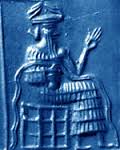
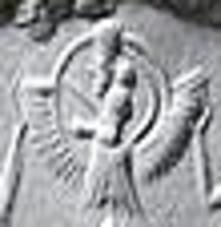
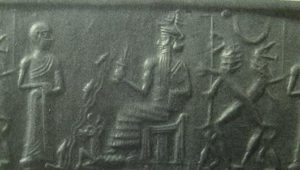 (Enki, oldest & wisest of gods on Earth) (Enki in his winged sky-disc, landing on Earth) (newly fashioned modern man & Enki)
(Enki, oldest & wisest of gods on Earth) (Enki in his winged sky-disc, landing on Earth) (newly fashioned modern man & Enki)
5) Enki / Ea, King Anu‘s eldest & wisest son via a concubine – ranking #40
6) spouse Ninki / Damkina, ex-king Alalu‘s daughter – ranking #35
. son of Anu & Urash, a concubine, born on Nibiru
. wisest of the gods, wrote his own biography, tales of his contributions to Earth
. master engineer, keeper of the ME’s (discs of knowledge)
. god over the “Waters”, ruler of the Abzu (marshlands of Persian Gulf)
. builder of ships, mined the gold in South Africa, shipped it bulk to Enlil
. at first the moon eclipse was Enki‘s symbol, later discarded as Nannar / Sin took on the moon crescent symbol
. a watery god 1/2 fish-1/2 man named Dagan was once used as his symbol (Enki in a wet suit)
. Enki‘s patron city was Eridu, the 1st city built, “Place of the Water”, his temple – residence was there
. Enki / E.A. “he whom home is water”, is accredited with forming the rivers and draining the marshlands
. Enki rivaled his younger ½ brother Enlil for Earth’s Command, etc., as King Anu‘s heir he was once promised through his arranged marriage to Alalu’s daughter Damkina / Ninki, for the agreed upon compromise to gain planet Nibiru unity
. Enki had six main sons – Marduk, Nergal, Ninagal, Gibil, Ningishzidda, Dumuzi, & many others
. Enki, sister Ninhursag, & son Ningishzidda genetically altered Homo erectus, giving him the “Tree of Knowledge”
. he provided his DNA for the fashioning of modern man, spouse Ninki carried baby Adapa up to the 10th month
. they made the mold to “Model Man” – “Adapa” – who would then reproduce
. Enki used “Model Man’s” descendants as “Workers” in the gold mines of South Africa, Enlil used them in Eden
. he genetically altered early man a second time to allow procreation of the new “Mighty Man” mixed-breed giant
. Enki had sex with the “Daughters of Man”, at the disgust of Enlil, then many others did the same
. he saved mankind from Enlil‘s complete extermination, helping his son, the mixed-breed Mighty Man Ziusudra (Sumerian), Utnapishtim (Akkadian), Altra-Hasis (Babylonian), Noah (Hebrew), survive the devastating floodwaters
. he is accredited with giving mankind animal domestication, construction, metallurgy, ship building, & much more
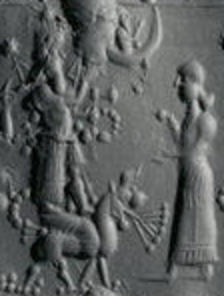
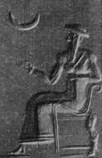
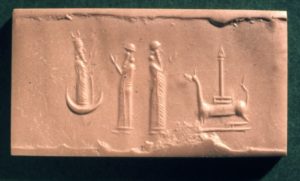 (Nannar above in sky-disc, man in the Moon) (Nannar, Moon Crescent god) (Nannar in sky-disc, Enlil, & Nabu praising Marduk)
(Nannar above in sky-disc, man in the Moon) (Nannar, Moon Crescent god) (Nannar in sky-disc, Enlil, & Nabu praising Marduk)
7) Nanna / Nannar / Sin / El, King Anu‘s grandson via Enlil – ranking #30
8) spouse Ningal – ranking #25 “Great Lady”
. eldest son of the ruling couple Enlil & Ninlil, born on Earth
. full older brother to Adad, younger ½ brother to Ninurta
. Sin had twins with spouse Ningal, Utu / Shamash & Inanna / Ishtar, a boy and a girl
. also produced son Papsukal & daughter Ereshkigal, goddess of the Under World
. the moon’s crescent was Nannar / Sin / El‘s symbol, still very much in use
. Nannar was god over his patron city-state Ur, home of Biblical Abraham
. Nannar‘s temple-residence in Ur was called Egishnugal “House of the Seed of the Throne”
. Biblical Terah, Abraham‘s father, was once high-priest of Nannar‘s temple-residence (ziggurat) in Ur
. Ur was abandoned when toxic fall-out came by way of the “terrible winds”
. Nannar became ill from the fall-out, retired, & his son Utu assumed the Moon Crescent Symbol
. Ur‘s high-priest Terah, Abraham’s father, led the flight from Ur to Harran following his god Nannar / Sin / El, the Biblical name for God
. Harran was built as an exact replica of Ur, and Sin was made its deity, Biblical Jacob, standing outside Harran, saw a ladder with cargo carried up to Heaven & cargo carried down to Earth
. a favored high priestess of Sin produced a mixed-breed son with god Nabu named Nabunaid, he built a temple to Sin, & was commander of the Babylonian armies, ruler of Sippar, Utu‘s patron city-state
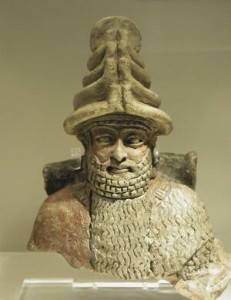
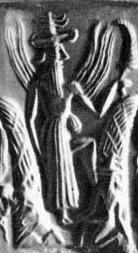
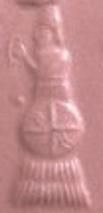
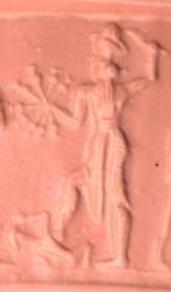 (Utu) (Commander of the launch sites) (Utu flying high in his sky-disc) (Utu with alien weaponry atop small disloyal earthling)
(Utu) (Commander of the launch sites) (Utu flying high in his sky-disc) (Utu with alien weaponry atop small disloyal earthling)
9) Utu / Shamash / Allah, King Anu‘s great-grandson via Enlil > Nannar – ranking #20
. Utu is son to Nannar & Ningal, grandson to Enlil, nephew to Adad, twin to Inanna
. married Aya / Aia, she was not given a ruling number
. Utu is heir to Nannar / Sin
. brother to Ereshkigal, queen of the “Lower World”
. Shamash: “The Shining One”, “The Sun” god
. Utu‘s patron city-state was Sippar, the 6th city built, “Land of the Missiles”, his temple – residence was there
. Utu the Commander of “The Space Port”
. Utu the Commander of the “Eagles” / pilots carrying cargo to & from planet Nibiru
. Utu’s temple – residence was Ebabbar, “Shining House” in Sippar
. Utu’s Supreme Court was located in his patron city, Sippar
. the great lawgiver, wise one, protector of travelers
. Shamash‘s symbol was the Sun, but upon father Nannar‘s retirement, the Moon’s Crescent was given to Utu as his new symbol
. mixed-breed son Meskiaggasher, of a mixed-breed mother, was 1st semi-divine giant king of Uruk / Biblical Erech
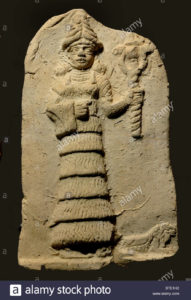
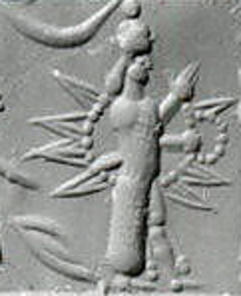
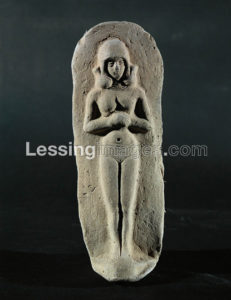
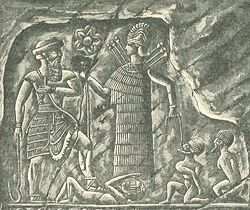 (Royal Princess Inanna) (Inanna in her sky-disc) (young Inanna, Goddess of Love (Utu, Inanna, Goddess of War, & earthling captives)
(Royal Princess Inanna) (Inanna in her sky-disc) (young Inanna, Goddess of Love (Utu, Inanna, Goddess of War, & earthling captives)
10) Inanna / Ishtar, King Anu‘s great-granddaughter via Enlil > Nannar – ranking #15
. “Anunitum” “Beloved of Anu”
. daughter to Nannar & Ningal
. twin to Utu, granddaughter to Enlil, mistress to King Anu (great-grandfather) when visiting Earth
. sister Ereshkigal, “Queen of the Lower World”, married Enki’s son Nergal
. stole 100 divine formulas from a drunken grand-uncle Enki
. Inanna married Dumuzi, youngest son to Enki, he had no ruling number
. the title “Goddess of Love and War” given to Inanna due to her many giant mixed-breed king lovers, & due to her continued desire for war against her cousin Marduk & others
. also known as Venus, Aphrodite, Ishtar, Astarte, Anat, & so on
. naked Inanna image on many stelea, statues, & rock carving artifacts
. ruled Aratta, then Uruk, the patron city-state of Anu, was given to Inanna
. she was once refused sex by Gilgamesh, Uruk’s 5th king, causing him a problem
. Leo is her Zodiac sign
. well known pilot with many depictions of her flying around in her MU (sky-ship) given by Anu, wearing the 7 MEs given by Enlil
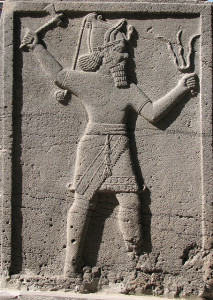
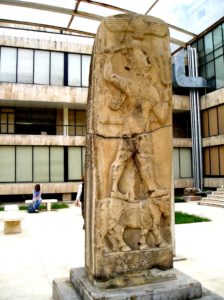
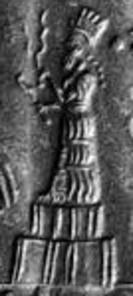
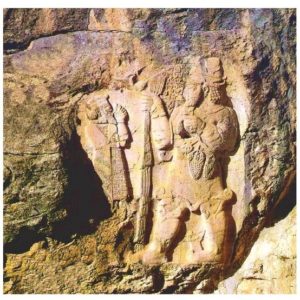 (Storm God Adad) (Adad stele in Aleppo) (Adad atop his ziggurat residence) (ancient king & giant Adad)
(Storm God Adad) (Adad stele in Aleppo) (Adad atop his ziggurat residence) (ancient king & giant Adad)
11) Adad / Ishkur, King Anu‘s grandson via Enlil – ranking #10
. son of Enlil & Ninlil, brother to Nannar / Sin, nephew to Enki
. younger ½ brother to Ninurta, uncle to Utu & Inanna
. deity of the mountain lands north & west of Mesopotamia
. known as the thunder god, depicted standing upon Taurus the Bull holding lightning & thunder
. married Shala / Hebat, Anu‘s daughter, she has no ruling number
. father to god Sarruma
. father to mixed-breed King Ur-Ninurta “…… may …… be his helper. …… the son of Ickur (Ishkur / Adad)…”
. father to mixed-breed King Amar-Suen / Bur-Suen “the son of Ickur (Ishkur / Adad)…whom you have called by name, Bur-Suen…”
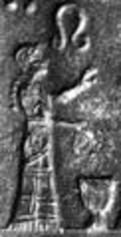

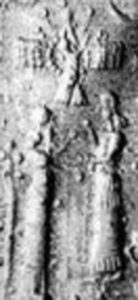
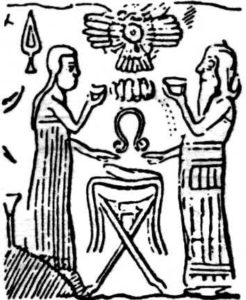 (Ninhursag & symbol) (attractive Ninhursag) (Enlil & Ninhursag with their son Ninurta in his sky-disc) (Ninhursag & Enki in their DNA lab)
(Ninhursag & symbol) (attractive Ninhursag) (Enlil & Ninhursag with their son Ninurta in his sky-disc) (Ninhursag & Enki in their DNA lab)
12) Ninhursag / Ninmah / Ninti, King Anu‘s eldest & wisest daughter via concubine Nammu – ranking #5
. Ninhursag, “Lady of the Mountainhead”, born on planet Nibiru
. daughter of Anu & Urash / Nammu, a concubine to King Anu
. sister to Enki, Bau, Martu, & others, older ½ sister to Enlil
. had children with both Enlil (boy Ninurta), & Enki (many girls & boys)
. son Ninurta becomes Enlil‘s heir to the crown, born of the “double seed”
. her patron city-state was Kish, Medical Center of Sumer
. chief nurse, “Lady of the Rib”, Mammu / Mamma / Mami / Mom
. worked with Enki & Ningishzidda to create Adapa, “Model Man”
. her symbol became the umbilical chord cutter, the Greek letter omega, also ohm
. Virgo is her Zodiac sign
Note: The highest ruling number in the Anunnaki system is #60, held by King Anu.
#60’s successor is the one holding the ruling rank of #50, (Enlil)
The female, sometimes a spouse, is usually given the next lesser number divisible by 5.
There are 6 male deities and 6 female deities among the ruling numbered twelve positions in the “Assembly of the Gods“.
